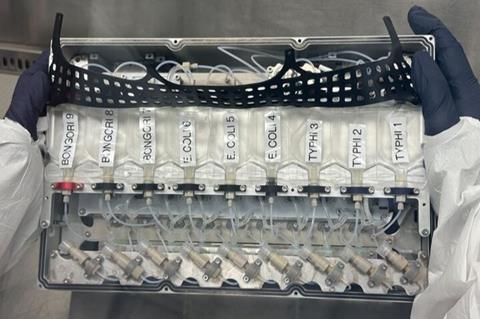ARC, the global transformation engine and innovation arm of world-leading Sheba Medical Center, in conjunction with the Israeli hospital’s Infectious Diseases Research Laboratory, will be sending a groundbreaking scientific experiment to the International Space Station (ISS) this week.

The ARC Space Lab experiment will explore how the extreme conditions of space, particularly microgravity, affect the genetic behavior of bacteria known to cause disease in humans.
READ MORE: From Earth to space: the journey of microbes and their survival mechanisms
READ MORE: Tough microbes found in NASA cleanrooms hold clues to space survival and biotech
The joint mission by NASA and SpaceX will launch from NASA’s Kennedy Space Center in Florida on July 31, 2025, at 12:09 PM EDT, as part of Crew-11. Developed in collaboration with the U.S.-based space technology company SpaceTango, the ARC Space Lab experiment will grow several bacterial species aboard the ISS using a specially designed Earth-controlled system. This is the second ARC Space Lab experiment, and the first that will take place at the ISS.
Researchers will analyze how space conditions impact gene expression related to virulence and antibiotic resistance. After growth under microgravity, the bacteria will be stabilized, frozen at -80°C and returned to Earth for molecular and transcriptional analysis and direct comparison to bacteria grown simultaneously in an identical lab setup on Earth.
Space conditions
Prof. Ohad Gal-Mor, Head of the Infectious Diseases Research Laboratory at Sheba, said: “We know that space conditions affect bacterial behavior, including how they grow, express genes, and acquire traits like antibiotic resistance or virulence. This experiment will allow us, for the first time, to systematically and molecularly map how the genetic expression profile of several pathogenic bacteria changes in space. The insights we gain will augment our understanding of infectious disease risks in space travel, and also expand our knowledge of gene regulation and bacterial physiology in general.”
It is well-documented that bacteria behave differently in space, often growing faster and displaying altered characteristics. Astronauts on long-duration missions are more prone to infections, likely due to a combination of microgravity, radiation, stress, and changes in the human microbiome. These challenges make microbiology and immunology vital components of modern and future space medicine.
In a previous ARC Space Lab study, the team examined bacterial conjugation, a process through which bacteria transfer DNA and gain new traits. Contrary to expectations, they found that space conditions reduce the ability of bacteria to acquire antibiotic resistance, a finding that drew significant interest in both the infectious diseases and space research communities. The results were published in the international peer-reviewed journal Microbiology Spectrum.
Beyond the limits of Earth
Prof. Eyal Zimlichman, Chief Transformation, Innovation, and AI Officer, and Director of ARC at Sheba Medical Center, said: “To understand the limits of medicine, we sometimes need to go beyond the limits of Earth. Our experiment in space examines how bacterial behavior changes under extreme conditions and what that means for human health—not just for astronauts, but also here on Earth. This is part of ARC’s mission to shape the future of medicine, wherever it’s needed.”
“Space Tango is excited to launch this groundbreaking microbiology experiment in collaboration with Sheba Medical Center, advancing research at the intersection of medicine and space. This project reflects our mission to support global, forward-thinking institutions to unearth answers and innovation,” added Twyman Clements, President & Co-founder of Space Tango.
ARC (Accelerate, Redesign, Collaborate), the innovation arm of Sheba Medical Center, founded and directed by Prof. Eyal Zimlichman, is shaping the future of medical innovation by connecting entrepreneurs and clinicians, advancing the development and implementation of new technologies, and creating breakthrough economic frameworks in healthcare. ARC’s unique model—the first of its kind in global healthcare—has evolved into a global blueprint, with a network of innovation centers in leading hospitals and research institutions across London, Melbourne, Singapore, Berlin, and New Zealand. ARC’s global network promotes technology-based medical solutions and accelerates the adoption of innovation within health systems worldwide. For more information, visit: https://sheba-global.com/.







No comments yet